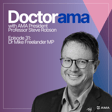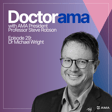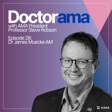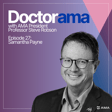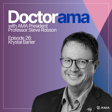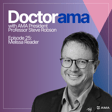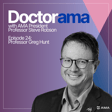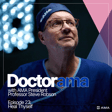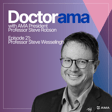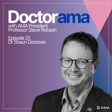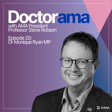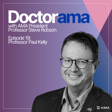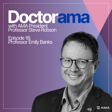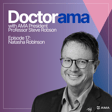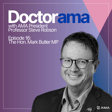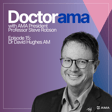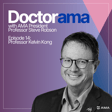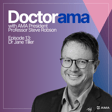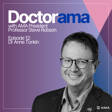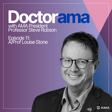Become a Creator today!Start creating today - Share your story with the world!
Start for free
00:00:00
00:00:01

Episode 30 - Dr Norman Swan
In episode 30 of Doctorama AMA President Professor Steve Robson chats with Dr Norman Swan.
Recommended
Transcript
Introduction and Guest Background
00:00:00
Speaker
I think everybody involved in medicine recognises that a lot of the medical literature we read isn't correct, although we don't know it at the time. In fact, it's been suggested a huge proportion actually is ultimately proven to be incorrect, but most of that isn't intentional. Occasionally, though, we find that there's misleading literature that's the result of fraud and deception. Well, I'll be talking a little bit about that with our guest today on Dr Rama.
00:00:31
Speaker
You're listening to Dr Rama with Steve Robson, bringing you the best of health, medicine and people. Well, I'm delighted to say that my guest today is someone that every one of you will know and probably feel like they know well. Dr Norman Swan, welcome to Dr Rama. Thanks very much Steve. Look, it's a real pleasure to have you on. You're a much more expert podcaster than I'll i'll ever be and a long time journalist.
Dr. Swan's Glasgow Upbringing
00:00:57
Speaker
I wanted to start though with your background and I know that you grew up in Glasgow and I'm really interested. A quote of yours really stuck with me. You said ah the the works of Henry Gibson um were popular because miserable theatre really worked well in Glasgow. What was it like as a youngster growing up in Glasgow in the 60s?
00:01:20
Speaker
um it was um look When kid's growing up, you't you've got nothing to compare nothing to compare it to. Glasgow is a coldish, very wet city, um and as opposed to Edinburgh. so It's like Sydney, Melbourne. As we didn't see, the best thing to come out of Edinburgh was the Glasgow train. and and that you Edinburgh might be have you know clear skies and sunny, but they're they're a bit colder and less friendly. So Glasgow, it was a very funny city. um glaswegians It's not just Billy Connolly, there's just a fantastic sense of humour in Glasgow. It's a very funny city. People are funny. And it's probably bred out of adversity. and so It's one of the health-wise, one of the unhealthiest cities statistically in Western Europe. Wow. Because it had some of the worst slums in Western Europe.
00:02:21
Speaker
So that was kind of environment. I mean, I grew up in ah in a middle-class environment, but the um my father went bankrupt when I was about 10, and we didn't have very much money. and um And I was state school educated. And what was interesting in those days is that it didn't really matter very much whether you're a state or private, it was educated. you know We ended up in medicine and law. It didn't seem to me much difference.
Influence of Theatre on Dr. Swan
00:02:45
Speaker
norman Growing up in Glasgow, I know that initially, and I suspect to this day, your interest was strongly around the arts and the stage and acting. How did that play out in Glasgow? Were they popular popular things in Glasgow at the time? It sounds like a sort of bit of a rough city. Look, I don't think there was any difference from any other city. the The interesting thing about Glasgow was, and I was obsessed with the theatre,
00:03:13
Speaker
And i um I used to go to the theatre by myself when I was an adolescent. One of my adolescent rebellions was when I was in the theatre. And there was this repertory theatre in Glasgow called the Glasgow Citizens Theatre, which was in the Gorgles, which was one of the worst slums one of the worst slums in the worst slums in Western Europe. And so it was this Gothic not strictly speaking, Gothic, but we've got Gothic building in a very ah troubled area, which wasn't that safe. And whether that affected their um programming, I don't know. But the Glasgow Citizens Theatre under its Artistic Director, Charles Havergill, was one of the one of the best exponents of Brecht outside the Berliner Ensemble his Germany.
00:04:04
Speaker
And it was also considered a a great exponent of Ibsen's plays, the Norwegian playwright. And so I grew up on this kind of miserable dark theater.
00:04:17
Speaker
And I often say it changed my brain. You know, you say, well, adolescents shouldn't smoke or take alcohol because it will change their brain. Well, I'm not sure you should go and see Ibsen or Brecht plays because that will probably change your brain too. and it was And I credit my brain being changed by they They put on Ibsen's last play, which is never put on. It's a dreadful play. It's really wrong boring, difficult. And without going into too much detail, ah the the the theme of the play, is the one of the main characters is an Ibsen-like character, a writer in a mountain resort in Norway. And he's being taken to the top of a mountain by this mysterious person. And at one point he says to the mysterious person, why are you taking me up this mountain? We're going up for the view. And he said, well, what's the view of? And and he said, well, from the top of the mountain, we'll be able to view your life. And what will I discover, says the Ibsen character.
00:05:14
Speaker
you'll discover that you never lived. So this penetrated my brain, like you know heroin or nicotine, and changed it forever. the eye The worst thing that could happen in your life was regret. And I was determined never to experience regret if I could possibly avoid
Choosing Medicine Over Acting
00:05:33
Speaker
it. Wow. Well, that is really something. I understand for reading that medicine was not a first choice of career, but that your mum really had a big hand in you studying medicine. Have I got that right? Kind of. I wouldn't get into medicine now. I don't know about you. No, I wouldn't either. Look, I want to become an actor.
00:05:57
Speaker
try telling a Jewish mother that her ambition for her Jewish son is not to become a Jewish doctor, but to become a Jewish actor who's out of work 97% of the time, that didn't go down well. um and you know and And I toyed with a few things, but the reality was, medicine was a pragmatic choice. for To say that now, particularly to your young EMA members who've really struggled to get the Gamsan into medicine,
00:06:24
Speaker
It was so much easier to get into medicine then, particularly in Britain. It was poorly paid. It it wasn't that popular. Yes, you had to get good results at school to get in. But nonetheless, it was an easy choice because you didn't have to make a decision about your career. You did medicine and you were on a track and there were lots of options open to you. So it wasn't a desire to save the world or, you know, I would have failed the interview at the first step because it was a pragmatic choice.
00:06:55
Speaker
Noam, what prompted the move to Australia? What led to you coming here from the UK? Well, during university, i um I did a lot of acting and directing, so I still had that bug. And then when I was going to do psychiatry and I got accepted onto a residency program in Philadelphia, but I decided I wanted to get more general medical experience, particularly in pediatrics. So I stayed on. And but it kept on coming back in the sense that I didn't want to get to my fifties.
00:07:24
Speaker
and look back on my life and wish it was something else that I had done. And so this acting thing was there. So I did, I was doing a one and two roster in in London. I basically spent most of my postgraduate years in London before I came to Sydney. And I decided I was going to do an audition for the Royal Academy of Dramatic Arts.
00:07:47
Speaker
And I failed it miserably. I mean, it was just embarrassing. It's embarrassing even now to think. So miserably. And I wanted to get on to the, uh, the registrar rotation at Guy's hospital to train the pediatrics. I'd got psychiatry out of my system and I'd missed the boat. I just, I'd missed the boat and I needed my membership. So I decided I'd come out to Australia for a year.
00:08:11
Speaker
get a good job at the Royal Alexandra Hospital of Children, the the old Children's Hospital at Campredown, and then you know go back and get on the guy's scheme and do my membership on the way. So I did i did that, I came out, I did my membership my British membership while I was in Australia, I went back to do that, got that, came back, and then this sense of dissatisfaction kept on coming back and I decided I would, it was much easier to do this in Australia than in
Transition to Journalism
00:08:39
Speaker
Britain. Take some time off. The children's hospital kept me on part time um as a registrar. And then I tried doing other things, one of which was writing. And I saw, towards the end of this period, I was going to go back to full-time pediatrics. And I saw an ad in the days when there were ads in newspapers, remember, yes. And there were classified ads. I saw an ad for, um,
00:09:05
Speaker
a producer to make science and medical programs on ABC radio. And if somebody had asked me what was my dream job, actually that was what it was. And to my amazement, I got it. Norman, just linking writing, journalism and pediatrics, you have a new book that's just come out. Just tell me a little bit about the book because it's to do with children. Yeah. it's so There's a third book in a series, and the theme behind the series is um you got you know everybody's got everybody you know you've got lots of people telling you what to do in life, what to eat, how to exercise, how to live younger longer, and some of it's right, some of it's wrong, but somebody's wagging their finger at you telling you what to do, and no more no place is this more acute than in parenting. And what I've done in previous books is say, look, here's the evidence. um you know That's what I spent a career doing in broadcasting. Here's the evidence.
00:10:01
Speaker
I've sifted through, I've done the hard work for you. Here's what works, here's what doesn't work. There's no confusion about it. And you make up your own
Dr. Swan's New Book on Parenting
00:10:09
Speaker
mind, you're an adult about your own health, and in this case about your children. And there is a gap in the market from, ah this is not children from not till 10, as you said, um the the real gap is these middle years, the five to 10 year group, yeah there's always nothing for parents in that group. Because they've always been told, these are the salad years. Nothing. Just sit back, enjoy them until the top the dark clouds of adolescence descend upon your family. And they will provide you with other books on adolescence, which are equally finger-winding. So i've I've covered these middle years because a lot goes on in those middle years.
00:10:46
Speaker
Adolescence starts, you know, anybody with a nine-year-old daughter, it's behaving like a 20-year-old knows this. But adolescents, the you know, the hormonal changes of puberty start often when you're eight or nine or ten years old. um And it's a terribly, comp ah we've got an increase in eating disorders, which I, before I started that researching the book, I thought, oh, this is a diagnostic phenomenon, but it's not. It's a real increase. Japanese are reporting it all over Australia and all over the world.
00:11:15
Speaker
um And there's an increase almost certainly in anxiety disorders in these kids too. So there's a lot going on and parents are a bit at sea. Yeah. Well, the book's out on the bookshelves now, so I'm sure a lot of our listeners will be interested in in chasing that up,
Exposing Medical Fraud
00:11:29
Speaker
Norman.
00:11:29
Speaker
your Korea really took off um in investigations around a now deceased obstetrician and gynecologist in Sydney, William McBride. And a lot of people may not recognise that you were the person heavily involved in exposing issues. I wonder if you just talk me through this because I find it absolutely fascinating and it was such a huge story of full of a fall from grace um around the world, really. it mean Would you like to share that with us? Yeah, in fact, casting aspersions on your age, Steve, you would remember going right and your specialty. so So a little bit of context here. I arrived in Sydney to do a registrar rotation in pediatrics and people were really friendly. And when I got to the hospital before the year started,
00:12:25
Speaker
And I met a few of my fellow registered people who would be my colleagues. um it became you You could make special requests for where you would spend your terms. And people said, oh, whatever you do, don't do the term at Crown Street Women's Hospital. So Crown Street Women's Hospital does not exist anymore yeah in Sydney. um and There was St Margaret's around the corner, but yeah there was Crown Street Women's Hospital. So why? Well, first of all,
00:12:53
Speaker
It's one on one, neonates, and you that' that's hard enough. Secondly, there's this ah obstetrician there who claims to have discovered the teratrogenicity of um me Thalidomide, but he didn't, it was his sister it was his sister on the post-NATO war, Sister Sparrow, who did. I'm getting this, you know, I'm just a newly arrived kid on the block. And your Wednesday nights are a nightmare because he's got a list on a Wednesday and he and he essentially induces women or does, he's got the highest cesarean section rate in the hospital and you are ventilating these babies overnight because they're
00:13:36
Speaker
I atrogenically pre-term. So this is the story I got. I mean, i so i so I said, well, i I'm really interested in neonates, but would you mind sending me to North Shore around Crown Street Women's Hospital to work with Peter Barr? Anyway, um I didn't forget about this story. and when And then I was at some do or other i joined the ab when had I joined the ABC, yeah and I was in journalism. I just started writing stories in journalism. but And I was at this event, a medical event, and somebody told me that there was a scandal at Foundation 41. So this was his research institute yeah next door to Crown Street Women's Hospital in Crown Street, Sydney. And as a scandal, he's been found, he's been involved in scientific fraud, but has been covered up with the
00:14:30
Speaker
People have been sacked and moved. So I got interested in this. yeah And when I did my interview for the ABC, I actually, right at the interview, they said, what sort of stories do you like to do? I said, well, there's ah there' a bit of a hint that there's a problem around ah Bill McBride. And they were interested, but you know I got into training your training to become a broadcaster and doing various things. And then I happened across the evidence, solid evidence that he had committed scientific fraud.
00:14:59
Speaker
And it took it to four corners and they weren't the slightest bit interested. So I decided to do it for myself on ABC radio through a science show. And I just, I spent some years researching it and gathering the information, gathering court. He was appearing in court in the United States because he was instrumental in having Debendocks, Bendis, taken off the market. yeah So for those who have have no idea what I'm talking about here, this was an anti-nausea drug of pregnancy, which is what thalidomide was touted as, was an anti-nausea drug, but it had these, it caused neuropathy and probably the neuropathy was what caused the limb defects in these babies. And when I got down to it, the story with thalidomide, when I got down to it, there was a track record here. um So he was appearing
00:15:49
Speaker
in cases for against diochemicals, which produced demon dogs. And in the end, they took demon dogs off the market, not because they lost any court cases, because they couldn't afford to to defend them yeah any longer. So they never lost a case there. And the story goes that what he did was, he was talking to a room full of... He got this idea that the anticholinergic drugs caused limb abnormalities.
00:16:20
Speaker
So he thought, well, it was an anticholinergic effect here. um He thought he got into trouble in the early 70s by saying that imipramine caused birth abnormalities when there was, he had no evidence of that. They went round the world. A man who discovered thalidomide, blah, blah, blah. And he, yeah he was appearing in court cases and being slaughtered in court.
00:16:44
Speaker
because he had no evidence to back up his condemnation of demon dogs. I mean, in one occasion, he gave a lecture to a room full of women with children who had who were Lynn deficient and say, well, put up your hands. Those of you who'd taken demon dogs and 30% of the hand see that that's proof that they want to cause birth analysis when 30% of all women took them close. And it turned out that it was true that he, that it,
00:17:12
Speaker
He was a prescriber of thalidomide when very few other obstetricians at Crown Street weren't. And he was the one who was getting, there weren't very many of them, but children who were then deficient. And the sister ah on the postnatal ward pinned it to thalidomide and he denied it. But eventually he saw the light and he wrote a very short letter to the Lancet. Now he always denied that it was the sister who told him that. Anyway,
00:17:39
Speaker
you know anyway he um He also almost certainly took the data for his MD without permission from his supervisor at Crown Street. We'd been collecting infertility data from his infertility clinic and went off on long service leave. And while he was on long service leave, he wrote up an MD based on his, that data. So there was this tract history and the the fraud was that he was getting slaughtered in court over his debit dogs. He needed proof.
00:18:10
Speaker
and he ordered his junior, one of the junior people in the lab, to do an experiment on rabbits, giving them scopolamine, and he altered the data. and there there was There was no significant result from that experiment, but he altered the data, added rabbits, to make it look as though scopolamine caused birth abnormalities in the pups the the rabbit pups and that was what I broadcast on and he ended up getting struck off. Yeah, it was an incredible, I mean, he was almost a global celebrity in the in the medical world after the thalidomide issue. I remember there used to be ads on television for Foundation 41 when I was ah a medical student. It was a famous institution. It sucked up a lot of the available philanthropy in Sydney. Yeah. um So you can say, well, that was so great because people weren't getting the money, but it was
00:19:02
Speaker
They didn't achieve anything. they They didn't have a high publication rate. There it wasn't a high quality institute where you had the Garvan around the corner. And those were in the days when philanthropy was pretty tight for medical research. um So that that you know there though there were some sour of grapes, and he always exploited that. But the reality is um it was his fiefdom. And there were some good researchers there, but really there wasn't the environment for them to flourish.
00:19:31
Speaker
Norman, how did you feel after bringing this to light and and seeing what happened to Bill McBride? Was it a sort of mixed feelings? what What did you experience in the aftermath of all of that? There was only one reason why I did that story, and that's that institutions in Australia had not come to terms with scientific fraud. They denied that it took place and they did not have procedures to deal with it.
00:19:56
Speaker
And really what had happened over the like the previous few years was there had been some notorious cases at Harvard and the University of California, San Diego. And um you know for example, the Harvard case was um in Eugene Brownwald's lab, which had hit Eugene Brownwald was a giant cardiology. He wasn't the person who committed the fraud, but it was somebody in his lab. yeah And he got away with it because he put Brownwald's name on his papers.
00:20:24
Speaker
The other one was a guy called Slutsky at University of California, San Diego. And he was publishing 10 papers a week at one point and putting people's names on the papers. And when the University of California's... And so Harvard handled it badly, but ba then Harvard put in place procedures to deal with scientific fraud, so they thought. And not long after that, Slutsky came to mind. They tried to do the right thing.
00:20:49
Speaker
and they And so they did a scary thing. They came to his co-authors and said, can you justify the data in these papers? yeah And a lot of the co-authors had no idea that it had been published, didn't know their name was on the paper, yeah and and so on and so forth. And and and we'd had a case in Australia, um and also in the 80s,
00:21:12
Speaker
when at Deakin University, which in those days was just in Geelong, hadn't moved to Melbourne, didn't know a medical school, but they had a ah a world famous nutritionist called Michael Briggs. Oh no, well, an endocrinologist, sorry, an endoc a reproductive researcher called Michael Briggs, not a nutritionist. And he was very popular in the media. He was great talent. He was always being used.
00:21:41
Speaker
And he did research on oral contraceptives. So he was a scientist running a doctor for memory. yeah And he started quoting research at Geelong Hospital, which people said, but for him to have done this research, we would have to know about it. yeah It was of involved nurses. And you know a bit of investigation had never gone through the ethics committee at Geelong Hospital. Basically, it hadn't occurred.
00:22:09
Speaker
and um
00:22:14
Speaker
and And anyway, Deakin University handled it really badly. Michael Briggs left the country before it could be fully investigated. And when somebody resigns from, he was taking money from drug companies. I think his wife worked for one of the the the manufacturers of oral contraceptives. He found oral contraceptives, so he said, in Beagle Dogs, which hadn't been done. I mean, it was just top to bottom, side to side fraud. And he he died and in unusual circumstances, I think, overseas somewhere. I think maybe Switzerland, but I can't remember exactly. so And Deacon handled it really badly. So of all these stories, and still we had nothing in place to deal with scientific fraud.
Addressing Scientific Fraud in Australia
00:23:00
Speaker
and here was McBride. And the purpose in doing it was, can we do something about this, please? Yeah, it's extraordinary. I mean, we ah we all we all try to to think the best and hope that people who are doing medical research are doing it with a good heart and and with good intent. But there clearly are people who are are not. And it's a dangerous thing. I mean, what do you think overall about the risks of medical fraud to, I guess, the integrity of the whole system? Well, it's become more complicated.
00:23:36
Speaker
um and And people debate about what is the right process to have in place. Should you have? an independent arbiter can be called in to investigate and so on. and so on um i so So what's happened in recent years is several cases of fraud involving blots. So for those listening who are clinicians and not done you know molecular biology research, you can put a drop of protein on a plate and then you
00:24:11
Speaker
ah put electrical current across it and on a gel and and there's southern blocks and there's western blocks and so on. And you get lines along the, along the blot, which identify proteins and you can, you and and then you can decide what you're dealing with and biochemically in in your sample, oversimplified and probably a bad explanation. But blots are essentially um like barcodes and the fraud that's been occurring is people plagiarizing blots or putting blots into their papers, which is somebody else's blots from previous research um claiming um findings which are not valid. And it's that's been happening all over the world, including in Australia, very hard to police because the
00:25:08
Speaker
It's well recognized that peer review is not good at picking up scientific fraud because you're you're just assuming that everything is, is as you said before, your your science has to be based on trust. We're not police, we're not forensic experts, yeah but um people like ah David Ward, the Walter and Liza Holland Institute and others argue that reviewers do need to be have forensic skills. And when they're looking and they're reviewing a paper, they need to look at things like the blots and the results. And sure, if the results are too perfect, that would raise anybody's shoot with any of the tackles. But also, um if the blots are looking a bit odd, then you've just got to start querying this. And it just adds a layer of complexity to fraud. And that's been
00:26:03
Speaker
a few of the cases recently. i mean they Other cases of fraud in the past have been where you've done the experiment and fiddled the results. Here, you're using fraudulent images to concoct results. Very hard. Yeah, yeah absolutely. That sophistication is is really frightening. And you can get drugs made from this. You're saying, well, you we should be developing a monoclonal antibody to that line on the... yeah What? and Doesn't this say worth all? Yeah, a total waste of of everybody's time and and potentially dangerous.
Conclusion and Acknowledgements
00:26:40
Speaker
Look, it's always a pleasure chatting Norman. um I would commend people to go and have a look for the book on children. I've reviewed a few. I've reviewed some that to Emily Oster, the economist, has put together, but she's not a doctor, so I'll keep an eye out for the book.
00:26:57
Speaker
um Thanks so much. I know that you're really busy and I hope we can actually talk again because there are so many things I think we could talk about. But I suspect a lot of our our listeners had no idea about your involvement in the the William McBride and the fraud. and And I really thank you for sharing all of that with our listeners today, Norman. My pleasure. Thanks. And welcome again to everybody who's been listening to Dr Rama.
00:27:31
Speaker
You've been listening to Dr Rama, a podcast produced on Ngunnawal country by the Australian Medical Association. All rights reserved.
